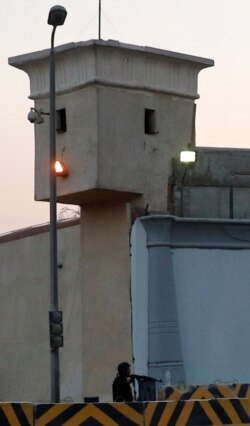The deaths from COVID-19 of two imprisoned journalists this month have raised alarm among press freedom advocates, who are calling for all journalists to be released during the pandemic.
On July 18, Honduran journalist David Romero died after contracting the virus at the Támara National Penitentiary. Romero, the former director of the media outlets Radio Globo and Globo TV, was more than a year into a 10-year prison sentence for defamation.
Romero was a vocal critic of Honduran President Juan Orlando Hernández. He accused Hernández and his family of being involved in corruption and drug trafficking, and when he was arrested in 2019, he told reporters, “I know they can kill me and, if that happens, the person responsible is the president.”
The president’s office rejected allegations of wrongdoing in a statement posted on social media.
Romero’s death came five days after Egyptian journalist Mohamed Monir died of COVID-19. Monir was arrested in June for allegedly being part of a terrorist organization, spreading false news and misusing social media. Weeks before his arrest, he had criticized the Egyptian government’s handling of the pandemic.
La versión que Pdte. @JuanOrlandoH supuestamente aceptó dinero de drogas de Geovanny Daniel Fuentes Ramírez, o dio protección o coordinación a narcotraficantes, es 100% falso y parece estar basado en mentiras de criminales confesos que buscan venganza o para reducir sus condenas.
— Casa Presidencial (@Presidencia_HN) March 3, 2020
Monir suffered from diabetes, high blood pressure and severe heart problems, the Committee to Protect Journalists (CPJ) reported at the time of his arrest. He was in pretrial detention at Tora Prison in Cairo when he became sick.
Monir was released from prison July 2 after falling ill. He died on July 13.
“To hear that a journalist died in pretrial detention means that journalist was essentially given a death sentence without trial for doing journalism,” Courtney Radsch, CPJ’s advocacy director, told VOA. “It’s devastating.”
As of December 1, at least 250 journalists were in jail worldwide for their work, according to an annual count by CPJ.
Amr Magdi, the Middle East and North Africa researcher for Human Rights Watch, said that a “conservative estimate” of the number of journalists currently imprisoned in Egypt is about 30.
Human Rights Watch released a report Monday that details the outbreak of COVID-19 in Egyptian prisons.
The report said at least 14 prisoners have died so far, most likely because of complications brought on by the virus.
Egypt has released 13,000 prisoners since February, but Magdi emphasized that this happens often and there has been no indication that the releases resulted from the pandemic. None of those released was a political prisoner, he said.
“Prison officers don't really look at prisoners as human subjects, as human beings,” Magdi said. “It's rather something inferior to human beings, something that doesn't deserve to care about their dignity and about their health.”
In 2014, Egyptian journalist Haitham Abu Khalil fled Egypt. Five years later, Egyptian authorities arrested his brother, Amr, to put pressure on Haitham. Amr remains in jail and has not received medical care despite showing symptoms of COVID-19, Haitham told VOA.
“His family is not allowed to visit him, and he is prevented from a daily break to exercise,” Haitham said. “The cruel conditions in the prison he is locked at are unimaginable.”
Press freedom groups and the international community have condemned the continued imprisonment of journalists, saying that the conditions in many jails are unsafe during a pandemic.
In late March, CPJ launched its 2020 #FreethePress campaign, calling on governments to release all journalists amid the global pandemic. The campaign received the backing of 192 press freedom and human rights organizations and more than 11,000 people.
The U.S. State Department released a statement in April calling for the release of all political prisoners, including journalists and human rights activists. But Radsch said “a tepid statement does not equate to meaningful diplomatic action.”
Political dissent is not a crime. In light of the global #COVID19 pandemic, we call on countries around the world to release all political prisoners, including journalists and other #HumanRights defenders, immediately and unconditionally.
— Bureau of Democracy, Human Rights, and Labor (@StateDRL) April 20, 2020
“It's really astounding to me that the international community that is devoted to protecting journalists and that depends on press freedom as a fundamental pillar of democracy has not stood up much more vocally to demand the release of journalists and political prisoners,” Radsch said.
CPJ is particularly concerned about the health of jailed journalists in countries that have higher rates of imprisonment, such as China and Turkey, Radsch said.
Last year, the Uyghur Human Rights Project announced that 58 Uighur journalists had been detained by China. The Uighurs are a Muslim-majority ethnic group in China’s Xinjiang province. China has operated a mass detention and anti-extremism program that the country says is aimed at education and training of the Uighur population. Rights groups call it outright persecution.
Mustafa Aksu, the program coordinator for the organization, told VOA that he remains worried about the safety of Uighur journalists, who were detained for advocating the Uighur language.
The capital of Xinjiang, Ürümqi, has seen a spike in COVID-19 cases in the past week, and it has since been put into a “wartime” lockdown, authorities there said. Aksu said that the status of journalists held in detention centers or jails is unknown.
“If they contract the virus, it would be a disaster,” Aksu said. “We ask the Chinese government to release these innocent journalists.”
Nisan Ahmado contributed to this report.






